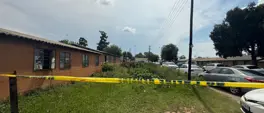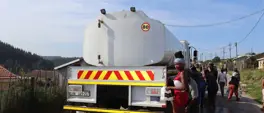JOE CLOETE: Green energy | Consider the implications before upsetting the tourism ecosystem
Joe Cloete
8 October 2024 | 8:49Tourists pay top dollar, pound, or euro for an African wilderness experience. They won’t do that to take home a picture of a giraffe with a wind turbine in the background, writes Joe Cloete.
Tourism is a fragile, interconnected ecosystem and things fall apart quickly if you take it for granted and don’t understand and nurture it.
It’s important to our economy. According to Stats SA, it contributes 8.2% to GDP and accounts for 9.2% of employment or approximately one in 11 jobs.
The Euromonitor travel industry report says tourism arrivals to South Africa increased 40% last year to exceed eight million. Inbound tourism generated over R100 billion.
Projections are that the sector’s contribution to GDP will grow to 10.4% by 2030 and it will employ 500,000 more people.
There’s reason for optimism, but much as when you meddle with nature without considering the implications, so too ill-considered decisions could jeopardise many of the tourism gains we’ve made since democracy.
It’s something we learnt, sometimes the hard way, at Shamwari. When we started reintroducing indigenous species over 30 years ago, it wasn’t just a case of buying up land and taking down fences. Each step had to be carefully planned to ensure enough space, food, and water for the animals to thrive. We also had to manage the balance between predator and prey species.
Then, when we thought we understood the complicated ecosystem on the reserve, we re-introduced wild dogs. It was a mistake, born of ignorance and arrogance, and these highly efficient predators upset the balance to the extent we had to reverse the decision.
Similarly, we can’t take tourism for granted.
When we opened our gates in 1992, people laughed at us. The Eastern Cape wasn’t considered an international tourism destination, let alone somewhere you’d go on safari. The first marketing job wasn’t to promote Shamwari as a wildlife tourism destination, but the entire province.
Today, international visitors flock to many reserves in the province, and the benefits are enormous.
Private reserves have a much bigger impact than most people realise. They play a vital role in conserving South Africa’s natural heritage.
Many are outstanding at doing this. With the ever-growing demands on State coffers, a constrained revenue base and the need to prioritise, government cannot support the extent and scale of conservation efforts in the country without private-sector support.
A 2023 University of Stellenbosch study found private reserves support the most white rhino populations on the continent, with projects at some of these reserves aiming to restore populations of endangered and highly endangered vulture species.
Reserves also contribute a wealth of scientific and practical knowledge about rehabilitating agricultural land and reintroducing indigenous species. Shamwari's rehabilitation centre, the largest and most advanced on the continent, is internationally recognised for its pioneering work, treating sick, injured and orphaned wild animals and returning them to the wild.
The benefits extend beyond conservation. According to a study by the Terrestrial Ecology Research Unit at Nelson Mandela Bay University, the economic benefits of conservation outweigh those of agriculture tenfold.
Private reserves are significant employers in rural areas with few other economic opportunities. Shamwari and other reserves procure as many services, produce and locally made merchandise as they can from surrounding small businesses. In some cases, we help establish these.
Unfortunately, this heritage, conservation and tourism ecosystem is now threatened. As opposed to poaching, mining, or rampant development, this threat is more insidious – renewable energy.
After all, in an energy-scarce country that is being encouraged to move away from environmentally damaging fossil fuels, few people would argue against renewables.
However, some planned wind farm developments in the Eastern Cape will be a disaster for tourism, with all the concomitant implications for the regional economy, jobs, hospitality investment and conservation.
Wind farms overlooking conservation areas will effectively kill off the flow of international tourists to the reserves and conservancies. It will undo three decades of work to restore the natural heritage, which resulted in the big five and numerous other indigenous species being reintroduced.
Conservation is an expensive business and private game reserves have no other source of revenue other than what guests spend when they visit. Tourism is what funds these projects. It contributes to a business model that absorbs the cost of conserving fauna and flora and its rehabilitation and protection.
Our guests pay top dollar, pound, or euro for an African wilderness experience. They won’t do that to take home a picture of a giraffe with a wind turbine in the background. There are plenty of other reserves in Kenya, Rwanda, Botswana and elsewhere they can go instead.
As conservationists, we’re not against renewable energy but oppose positioning wind farms without considering the substantial economic, social and environmental consequences.
If the planned wind farm developments proceed, the implications will be felt for generations, not only in environmental terms but for every part of the provincial economy that benefits from conservation, and the tourism revenue it brings.
Joe Cloete is the CEO of Shamwari Private Game Reserve.
Get the whole picture 💡
Take a look at the topic timeline for all related articles.















